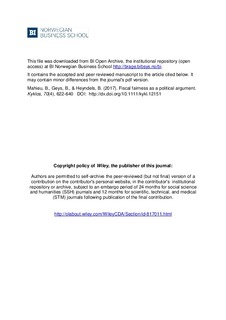| dc.contributor.author | Mahieu, Bram | |
| dc.contributor.author | Geys, Benny | |
| dc.contributor.author | Heyndels, Bruno | |
| dc.date.accessioned | 2017-11-01T09:54:26Z | |
| dc.date.available | 2017-11-01T09:54:26Z | |
| dc.date.created | 2017-05-04T10:20:16Z | |
| dc.date.issued | 2017 | |
| dc.identifier.citation | Kyklos, 2017, 70(4), 622-640 | nb_NO |
| dc.identifier.issn | 0023-5962 | |
| dc.identifier.issn | 1467-6435 | |
| dc.identifier.uri | http://hdl.handle.net/11250/2463378 | |
| dc.description | The accepted and peer reviewed manuscript to the article | nb_NO |
| dc.description.abstract | Governments typically apply several tax instruments. The tax choice literature sees the choice among these as depending on the political costs involved. One source of such costs is (horizontal) inequity in the distribution of the tax burden. In this article, we provide the first empirical test of the question whether and to what extent such inequity affects tax choices. Using data on housing sales and tax policy in Flemish municipalities, we create an indicator for the inequity of the local property tax. The latter is levied on the property's assessed rental value, and its inequity is a by-product of the slow reassessment procedure, leading to a situation in which properties of identical value are taxed very differently. We find clear evidence that municipalities in which property taxation is more inequitable tend to rely less on this tax as a source of municipal revenue. | nb_NO |
| dc.language.iso | eng | nb_NO |
| dc.publisher | Wiley | nb_NO |
| dc.title | Fiscal fairness as a political argument | nb_NO |
| dc.type | Journal article | nb_NO |
| dc.type | Peer reviewed | nb_NO |
| dc.source.journal | Kyklos (Basel) | nb_NO |
| dc.identifier.doi | http://dx.doi.org/10.1111/kykl.12151 | |
| dc.identifier.cristin | 1468056 | |
| dc.description.localcode | 1, Forfatterversjon | nb_NO |
| cristin.unitcode | 158,3,0,0 | |
| cristin.unitname | Institutt for samfunnsøkonomi | |
| cristin.ispublished | false | |
| cristin.fulltext | postprint | |
| cristin.qualitycode | 1 | |
